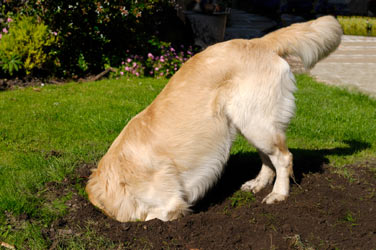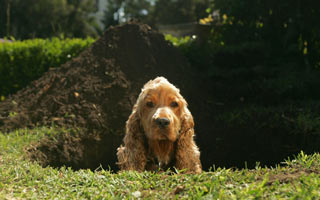How to Stop a Dog from Digging

As anyone with a dog that digs holes in their yard can attest, it can be a frustrating problem that's difficult to resolve. Some dogs just seem to love to dig, and it has many of us upset over the loss of expensive, time-consuming landscaping. How can you keep your dog from digging?
Why Do Dogs Dig?
There are many reasons dogs may dig holes. Determining the cause will help you to form a plan to deter the digging habit.
-
Dogs dig to entertain themselves.
- Digging is a normal dog behavior—it's just fun. Some dogs, like terriers, are more prone to digging behavior than others because they were bred for it.
- If your dog is digging purely for entertainment, you may see him dig a little bit, jump around and do some acrobatics, then dig a little somewhere else. The resulting holes do not have a pattern.
-
Dogs dig to create a comfortable, cool spot to lie in during hot weather.
- These types of holes are often dug under trees or near water, and your dog can be seen lying in them.
-
During cold weather, dogs dig to make themselves a spot that is more sheltered from the wind and elements.
- These holes are most commonly dug next to buildings or under trees, and your dog can be seen curling up in them during cold, rainy, or windy weather.
- Dogs may dig to try and find water if they don't have a good source available to them.
-
Dogs dig because they are aware of a ground-dwelling creature, like a mole or insects, in the area.
- These holes are often dug in a straight line across the yard, following a mole's burrowing tracks. They may also be near tree roots, where insects like to gather.
-
Separation anxiety can trigger digging behavior.
- Digging may release emotional energy for a dog that is upset or stressed about something or one that suffers from separation anxiety.
- You will most likely see other signs of separation anxiety if this is the cause of your dog's digging. Your dog may become upset when you are preparing to leave the house or make messes when left inside while you're gone.
-
Some dogs dig in order to try and escape.
- Dogs may be trying to escape the yard in order to find resources, if they are left without proper food, water, and shelter.
- Sometimes, dogs try to escape the yard because they are bored. They are looking for a change of scenery and something fun to do.
- Your dog may be trying to escape to chase prey.
- If you have a male dog that is not neutered, he may be trying to escape because he knows there is a female in the area.
- These holes are generally along fence lines or at gates.
-
Some dogs like to bury treasures and then dig them up again.
- A dog that digs to bury things will usually display the same behavior indoors, hiding treats and toys under blankets or in couch cushions, then pulling them out and "burying" them again somewhere else.
How to Keep Dogs from Digging

Once you have an idea of why your dog is digging holes in your yard, you can formulate a plan to encourage him to stop.
Never punish your dog for digging holes. His digging has a specific cause, and it can be dissuaded through positive reinforcement of the behavior that you want to see. Also, any attention, even negative, may serve to reinforce the behavior if the dog is digging out of boredom or lack of interaction.
If your dog is digging to create shelter from the cold, heat, rain, or to try and find water:
- Keep your dog inside during bad weather conditions.
- If you absolutely must keep your dog outdoors when the conditions are extreme, you need to provide proper accommodations. This includes a shelter that will protect him from wind, sun, and rain.
- Dogs need plenty of fresh, clean water during hot weather.
- During cold weather, it's critical to make sure that dogs that are outside have fresh, unfrozen water.
- It's important that a dog has a water bowl that can't be tipped over, as this may leave him without water if he's alone outside.
If your dog is digging to escape:
- Make sure that your dog has all of the resources he needs when you leave him in the yard alone (food, water, and shelter).
- Having your male dog neutered will help deter unwanted territorial or mating-related escape efforts. Having your female dog spayed will prevent a male dog from entering your yard and causing an unwanted pregnancy.
- In order to deter boredom-related escape attempts while your dog is in the yard unsupervised, provide him with lots of entertaining toys.
- Bury large rocks or chicken wire a few inches below the fence to deter your dog from digging there.
If your dog is digging due to separation anxiety:
- Separation anxiety can be difficult to treat. You can find more information about it here. A great product that can help with separation anxiety is the Adaptil™ Collar for Dogs. It contains pheromones that are calming to dogs and may help your dog feel better about being left alone.
- Provide your dog with lots of exercise when you are with him.
- Leave a variety of toys for your dog to distract him while you're gone, and switch them out frequently. Puzzle toys and food-rewarding toys like Kongs can be helpful.
If your dog is digging for entertainment, to catch prey, or to bury and rebury treasures:
-
Digging is a normal behavior for dogs in these instances and, as such, it can be difficult to deter. The best course of action here is to provide your dog with an area of the yard where digging is allowed. This could be a corner section that you don't mind having dug up or a child's swimming pool or sandbox filled with loose dirt.
- Encourage your dog to use the preferred spot to dig in by burying lots of fun toys and treats in it for him to discover. You will need to change these frequently.
- Simultaneously attempt to make the unwanted digging areas less rewarding for your dog to dig in by burying chicken wire or rocks a small distance under the dirt in these areas or simply placing them on top of the ground.
- When you see your dog digging in an unwanted area, say firmly "No dig," and lead him to the preferred spot. When he digs there, reward him with a treat and large amounts of praise.
- Provide plenty of exercise and interactive play when you are with your dog. A ten-minute game of fetch once or twice a day is an excellent way to have fun with your dog while helping him to release energy that may otherwise be used for negative behaviors like digging.
You May Also Like These Articles:
How to Prevent Lawn Burn from Dog Urine
Tips for the First Few Weeks with Multiple Dogs
How to Be Prepared for Your Dog's Veterinary Bills
Disclaimer: This website is not intended to replace professional consultation, diagnosis, or treatment by a licensed veterinarian. If you require any veterinary related advice, contact your veterinarian promptly. Information at DogHealth.com is exclusively of a general reference nature. Do not disregard veterinary advice or delay treatment as a result of accessing information at this site. Just Answer is an external service not affiliated with DogHealth.com.
Notice: Ask-a-Vet is an affiliated service for those who wish to speak with a veterinary professional about their pet's specific condition. Initially, a bot will ask questions to determine the general nature of your concern. Then, you will be transferred to a human. There is a charge for the service if you choose to connect to a veterinarian. Ask-a-Vet is not manned by the staff or owners of DogHealth.com, and the advice given should not delay or replace a visit to your veterinarian.


